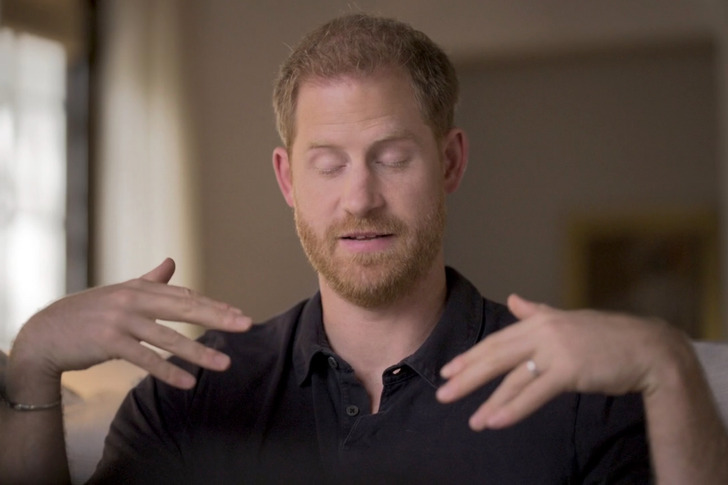Prince Harry recently opened up about his journey with post-traumatic stress disorder following the loss of his mother, Princess Diana. In a candid discussion, he revealed his exploration of a groundbreaking therapy that helped him.

The therapy is called eye movement desensitization and reprocessing (EMDR) to address the debilitating effects of his anxiety attacks. This revelation offers a glimpse into the royal’s personal struggles and his proactive approach towards mental health care, shedding light on the significance of seeking innovative treatments of traumas.
In a video, Prince Harry can be seen undergoing EMDR therapy, where he taps his shoulders and moves his eyes rapidly. This therapy is relatively new and is used to treat PTSD. Prince Harry shared that he decided to try EMDR to deal with severe anxiety attacks he was experiencing.
Prince Harry mentioned that he was open to trying EMDR because of the therapy and work he had done over the years.

During a therapy session with UK-based psychotherapist Sanja Oakley, Prince Harry demonstrated how EMDR helped him feel better about returning home. He described feeling scared and helpless before, but the therapy helped him cope with those feelings.
Prince Harry’s openness about his experience with EMDR therapy sheds light on alternative treatments for post-traumatic disorder and mental health struggles. It shows that seeking help and trying different therapies can make a difference in managing mental health conditions.

EMDR is a therapy made in 1987 to help with emotional traumas. It’s a structured therapy where you think about a tough memory while moving your eyes back and forth. This helps lessen the strong feelings tied to the memory.
EMDR works on a theory called Adaptive Information Processing (AIP). It says that trauma sticks around because it hasn’t been dealt with properly. So, when something reminds you of the trauma, those memories can come back strongly.
Unlike other therapies that try to lessen your reaction to trauma, EMDR tries to change how your brain stores those tough memories. Sometimes, instead of eye movements, you might listen to alternating tones. Usually, EMDR happens once or twice a week for about six to 12 sessions. But it can vary depending on the person.
Benefits of EMDR therapy
- EMDR is a structured therapy and usually needs fewer sessions than ongoing therapies.
- You don’t have to keep going back to the tough memory for a long time.
- You don’t have to talk a lot about what happened to you.
- There’s no homework to do.
- EMDR doesn’t try to change your thoughts and beliefs.
Disadvantages of EMDR therapy
- While EMDR is known to help with PTSD, it hasn’t been studied as much for other mood or mental health problems.
- If you’re avoiding talking about a tough event, EMDR might not be the best choice. Other types of talk therapy might work better.
- EMDR can sometimes make you feel worse at the start of treatment. The person who created EMDR warns that this could be dangerous for people who have gone through really tough things.
The process of EMDR
EMDR is a structured process with eight phases, each aimed at helping you deal with traumatic memories:
- History taking: Discuss your past with the therapist to identify which memories to focus on.
- Preparation: Learn about EMDR and how the therapist will use bilateral stimulation.
- Assessment: Identify your negative and positive beliefs related to the trauma.
- Desensitization: Use bilateral stimulation while recalling the memory.
- Installation: Focus on positive beliefs while processing the memory.
- Body scan: Talk about how you feel emotionally and physically.
- Closure: Prepare for what may happen between sessions.
- Reevaluation: Assess your progress and decide if more sessions are needed.
As you go through EMDR, you may start feeling less overwhelmed by the trauma. It’s normal for other painful memories to surface, indicating that suppressed memories are being processed.
When grappling with deep emotional traumas, it’s crucial to seek out specialists who can provide the appropriate form of treatment tailored to your needs. Whether it’s EMDR therapy or other therapeutic approaches, finding the right professional can make a significant difference in your healing journey.
Preview photo credit Good Morning America / YouTube
I Discovered My Mother-in-Law and Husband’s Scheme to Conceal Food From Me Because I’m ‘Too Fat’ — I Retaliated Against Both of Them

Emily was appalled when she overheard her mother-in-law and husband plotting in hushed tones. Their plan to hide food from her because they thought she was “too fat” was deeply upsetting. Striving to put an end to this toxic behavior, Emily cleverly orchestrated a fitting revenge neither would anticipate.
“Honey, but you don’t want to live with an elephant, do you?” Noele’s voice rang from the kitchen.
I froze on the couch, my knitting needles suspended. Did I hear that correctly? My heart pounded as I strained to hear more.
“I don’t, but she’ll notice it and start asking questions,” my husband replied with uncertainty.
“Act clueless. I’ll remove all the food. I’m ashamed that my daughter-in-law is so large. She’s too fat,” Noele continued, her voice laced with contempt.
My heart felt as if it shattered into countless pieces. Three years ago, after having our son at 40, I struggled to regain my pre-pregnancy body.

I toiled long hours to support our family, even extending financial help to Noele when she needed it. How could she say such hurtful things about me?
Setting down my knitting, I stared at the wall, trying to process the conversation I had just overheard. Tears welled up, but I blinked them back. I didn’t want to break down now.
My phone buzzed, pulling me from my thoughts. I realized I had been sitting in a daze, replaying the events of the previous week when Noele had visited us.
Unbeknownst to me, the missing food was her doing. She had been stealthily clearing out the fridge, not wanting her son to be married to a “fat” woman.
Taking a deep breath, I checked the phone. It was a message from Alexander, my husband.
It read: “Hey honey, don’t wait up. My friends are insisting I stay a little longer :)”
Recently, he always seemed to have an excuse to stay out. I began to wonder if my weight was the reason. Did he really see me as an elephant?



Leave a Reply